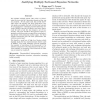92 search results - page 13 / 19 » Acting Optimally in Partially Observable Stochastic Domains |
107
click to vote
JAIR
2008
15 years 1 months ago
2008
Partially Observable Markov Decision Processes (POMDPs) provide a rich framework for sequential decision-making under uncertainty in stochastic domains. However, solving a POMDP i...
142
click to vote
CORR
2011
Springer
14 years 8 months ago
2011
Springer
Modeling the behavior of imperfect agents from a small number of observations is a difficult, but important task. In the singleagent decision-theoretic setting, inverse optimal co...
118
click to vote
ECCV
2004
Springer
16 years 3 months ago
2004
Springer
We present a vision based, adaptive, decision theoretic model of human facial displays in interactions. The model is a partially observable Markov decision process, or POMDP. A POM...
120
click to vote
ATAL
2007
Springer
15 years 8 months ago
2007
Springer
A problem of planning for cooperative teams under uncertainty is a crucial one in multiagent systems. Decentralized partially observable Markov decision processes (DECPOMDPs) prov...
ICMAS
2000
15 years 3 months ago
2000
We consider multiple agents who's task is to determine the true state of a uncertain domain so they can act properly. If each agent only has partial knowledge about the domai...

